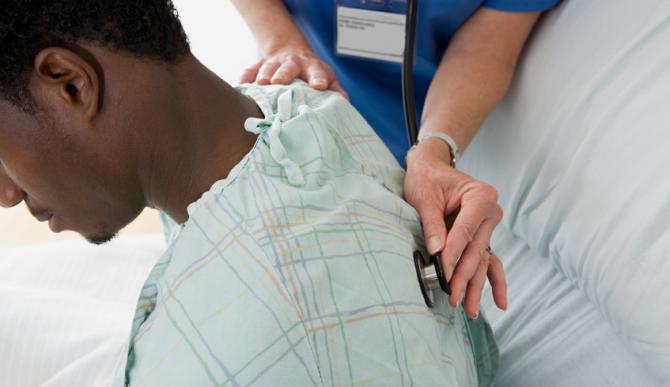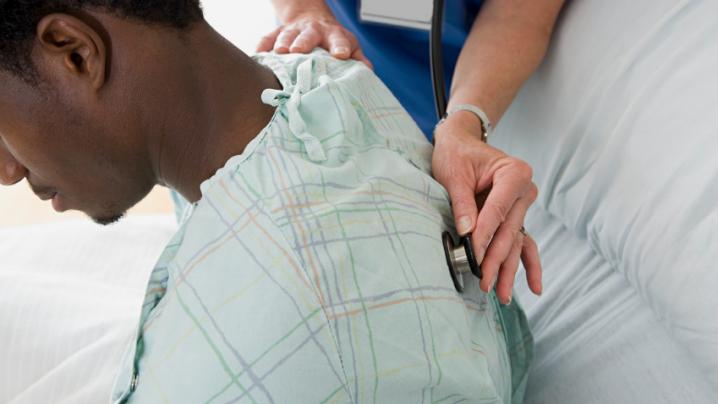[ad_1]

As it was for many others, the news of the death of Malik Taylor deeply resonated with and saddened me. But my feelings about this didn’t have much to do with his iconic status and/or my relationship with his music. Although my backpack is as massive as any other hip-hop fan’s—shake it and a Soundbombing album might fall out—I never was a huge fan of A Tribe Called Quest.
This is likely because the height of their popularity coincided with my stint at a private Catholic middle school. I was in a hip-hop-less vacuum for four or five years, entering in 1990—covered in MC Hammer residue—and emerging to a rap world dominated by Bad Boy, Nas, Wu-Tang and Death Row.
Instead, my sadness is due to the health-related death of another black man not even close to the age when health-related deaths are supposed to happen. And I’m just as scared as I am sad.
Within the last year, I’ve seen the death of my longtime barber, the death of the beloved boyfriend of the person who gave me my first paid writing gig, the death of a talented journalist I didn’t personally know but who seemed to know every black media person I know, and the sudden, health-related deaths of several other black men, either connected to people in my Facebook feed or an actual Facebook friend. All men 45 or younger. And each instance of this happening is scarier than the last.
Yet the existence of this fear in me is a form of cognitive dissonance. On one hand, these types of deaths make my own mortality more present and more real.
But I haven’t been to a doctor in four years.
OK, that’s a lie. I went to a doctor two years ago. I felt some pain in my knee while playing basketball, so I went to a sports medicine guy, did some tests (verdict? His words: “Nothing’s wrong; you’re just old”) and got a brace to wear while playing. And I got tested for sexually transmitted diseases a couple years before that.
But even those doctor visits connect to how I’ve been self-assessing my own health. How healthy I deem myself to be depends on whether I can still play basketball effectively and if my penis is still attached and functional and not fluorescent green. But if you asked me what my blood pressure was, or what caused that random headache that hit me while driving two weeks ago, or where that sharp and shooting pain in the big toe on my right foot yesterday came from, I couldn’t tell you.
Also, I’m aware I’m not alone. This is one of the few instances where the personal, anecdotal, observational and clinical all tell the same story. I know I don’t go to the doctor as much as I should. I’ve read and heard stories from concerned wives and girlfriends and friends and aunts about the men in their lives not going to the doctor. I’ve listened to my black male friends complain about maladies for months without actually seeing someone. And I’ve read numerous studies about how black men are loath to seek medical help. This is true despite the fact that we’re disproportionately at risk for everything from heart disease and hypertension to alien invasions and being black while black.
Of course, there are myriad reasons for this phenomenon, including financial situations that may make health care seem like a frivolous or unreasonable expense, a pervasive mistrust of doctors, and a learned and conditioned hyperheterosexuality that, among other things, makes us reluctant to admit to pain or weakness. Personally, I’m more of the ostrich with his head in the sand. If I ignore whatever’s bothering me long enough, I think, it’ll go away.
Regardless of why we happen to be this way, at a certain point we have to call it what it is. Selfish.
Yes. Selfish. Because while we’re the ones who feel the direct physical effects of this unease toward health care, our friends and family members are the ones who have to deal with us. While we struggle with preventable conditions or complain about chronic pains or wait so long to go that by the time we do go, it’s too late, they’re the ones who have to carry the emotional weight. The burdens of caring for us and pushing our grown-ass asses to the doctor like we were toddlers. The agonies of planning lives with us but planning funerals instead. There are few ironies deadlier than the fact that we—a demographic that made it through the “16- to 25-year-old black males are endangered species” phase alive—don’t do everything we can to make sure we keep living.
And to be clear, I’m not attempting to connect the deaths of Malik Taylor and the rest of the men I mentioned earlier to our (black men’s) general feelings about health care. I wouldn’t dare presume to know anything about their own medical histories, whether they saw doctors regularly or whether seeing a doctor regularly could have prevented their deaths.
All I know is that I’m tired of seeing this happen to us, and so scared of it happening to me that I’m scheduling a physical for next week.
[ad_2]






















